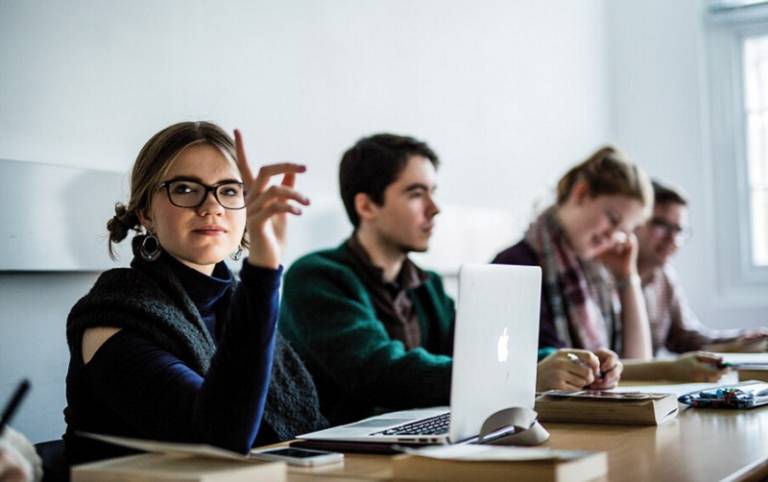Five ways Greek & Latin improved their NSS results by 25% in one year
Fiachra Mac Góráin, Associate Professor of Classics, explains how creating a supportive environment for your students can make the biggest difference to NSS satisfaction scores.

30 January 2020
UCL Greek & Latin boost NSS scores
UCL Greek & Latin took concrete steps to dramatically improve their National Student Survey (NSS) results in just one year.
The NSS, in which all UK final year undergraduate students are invited to submit their honest feedback on their university experience, is managed on behalf of the Office for Students (OfS) by Ipsos MORI, an independent survey research agency, which runs the NSS during the second term each year.
After receiving below average results of 70% overall satisfaction in the 2018 survey, the department recognised something had to change. They developed a plan to re-engage with their students and ensure they felt heard.
By the following year, Greek & Latin had raised their overall student satisfaction score to 94, making them the second-highest scoring department across UCL in 2019.
Based on their hugely successful experience, Undergraduate Departmental Tutor, Fiachra Mac Góráin, shares Greek & Latin’s five tips to boosting student satisfaction.
1. Seek out best practice
Speaking to other departments who have done well in previous surveys is a good place to start. We approached colleagues in the Institute of Archaeology to ask how they achieved such positive NSS scores.
A few colleagues from both departments met for an informal chat and compared departmental procedures in relation to students.
Colleagues from Archaeology were very generous with sharing their experience and ideas about how we could replicate some of what they did in our own way, and within our own structures. This helped us to adapt and implement some of these elements in Greek & Latin.
2. Develop a supportive office culture
Student-facing academic and professional service colleagues were encouraged to adopt a supportive attitude towards all students. The Head of Department and I reinforced the importance of student satisfaction with frontline colleagues so that students’ problems were always taken seriously.
Students often find it bewildering when they have to liaise with different parts of UCL. When students needed help navigating UCL’s large and complex structure, the department offered assistance and ensured that all issues were handled with care and attention.
What matters most for improving NSS scores is a positive and supportive atmosphere in the department, and a sense that the students are at the heart of what we do and care about. If students feel happy, and know that staff are available and interested in them, they will be very understanding of any human shortcomings. (Fiachra Mac Góráin, Associate Professor of Classics)
3. Use the Annual Student Experience Review (ASER) process to learn from your students
As part of the ASER process, the department held extensive face-to-face consultations with students, either one-on-one or in groups. We asked them to review previous NSS scores and offer suggestions on what could be done better in the department and across UCL. Students gave feedback from their own point of view, as well as those gathered from their peers.
The issues raised by students were then discussed with the Head of Department and Departmental Teaching Committee, to decide how we could best address each point.
A section of the ASER Development and Enhancement plan lists the matters that students raised and how the department proposed to respond. All in all, the process was very beneficial because it was direct, immediate and specific to the department’s own students and procedures.
ASER was not the only forum used to uncover student opinion; the Departmental Tutor also invited student representatives and anyone else who was interested, to come and speak to him directly about how they felt the student experience in the Department could be improved.
4. Collaborate with a student society
The department gave a high level of support to the Classics Society, which ran a number of successful events. For example, the department received incentive funds for having reached the institution's target NSS response rate. The department provided these funds as a cash contribution to the Classics society, which supported them to organise their end-of-year ball.
This was a particularly enjoyable and memorable event for our students, with many of them sending in reports and photos.
The lead-up to the event also seemed to have been very good for building community spirit and sense of student ownership in the department, with students providing regular updates to staff.
5. Run social-academic events...with wine and pizza!
The department specifically targeted the NSS question on having ‘opportunity to learn what research staff in my department were doing’ by holding a series of social-academic events called ‘Wine @ 6’ throughout the academic year.
All students were invited to informal meetings, where wine and pizza were provided. At each event a member of academic staff would talk about their research. This gave students the opportunity to see their lecturers in a more informal capacity.
These events were well attended and received positive feedback throughout the year from Classics Society committee members. The series gave students the opportunity to learn about their tutor’s research and showed them that the staff were available and listening.
 Close
Close

